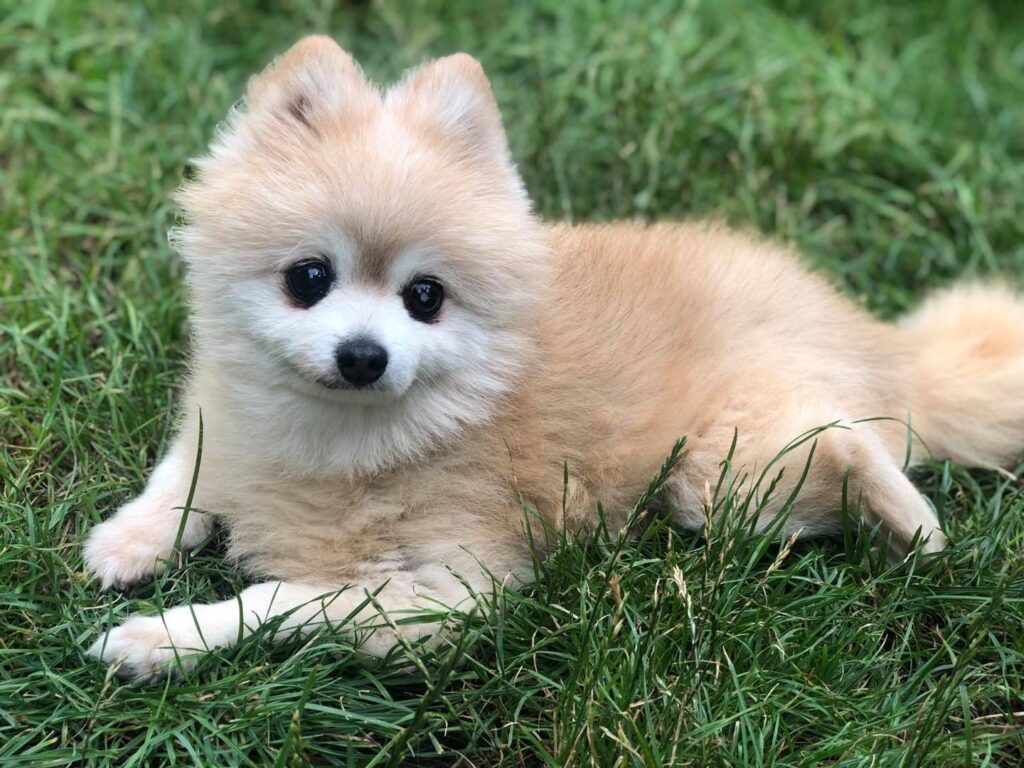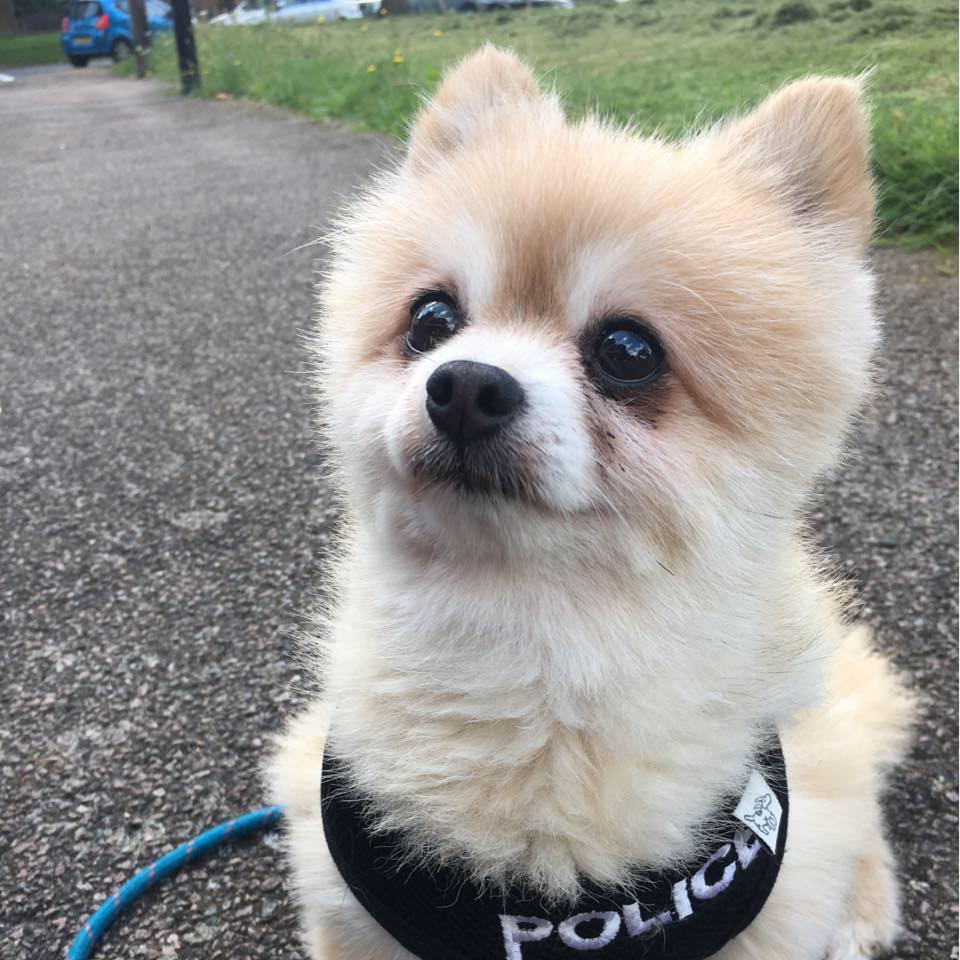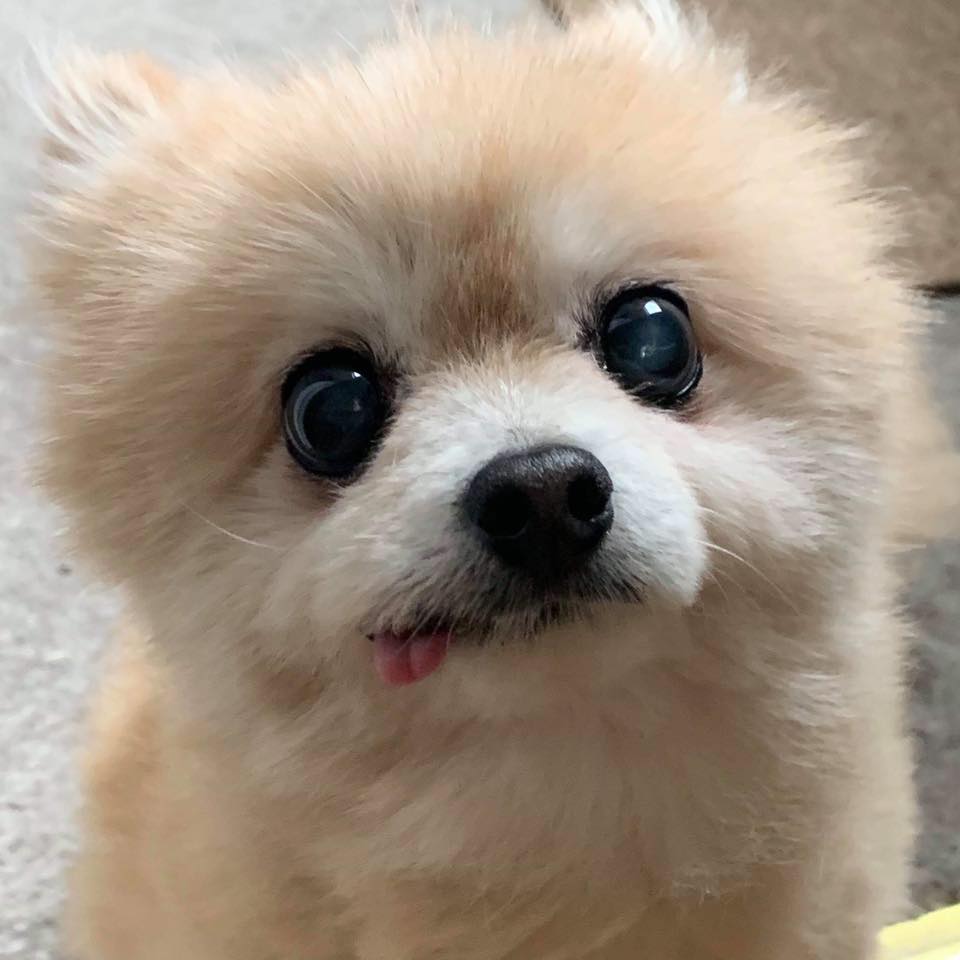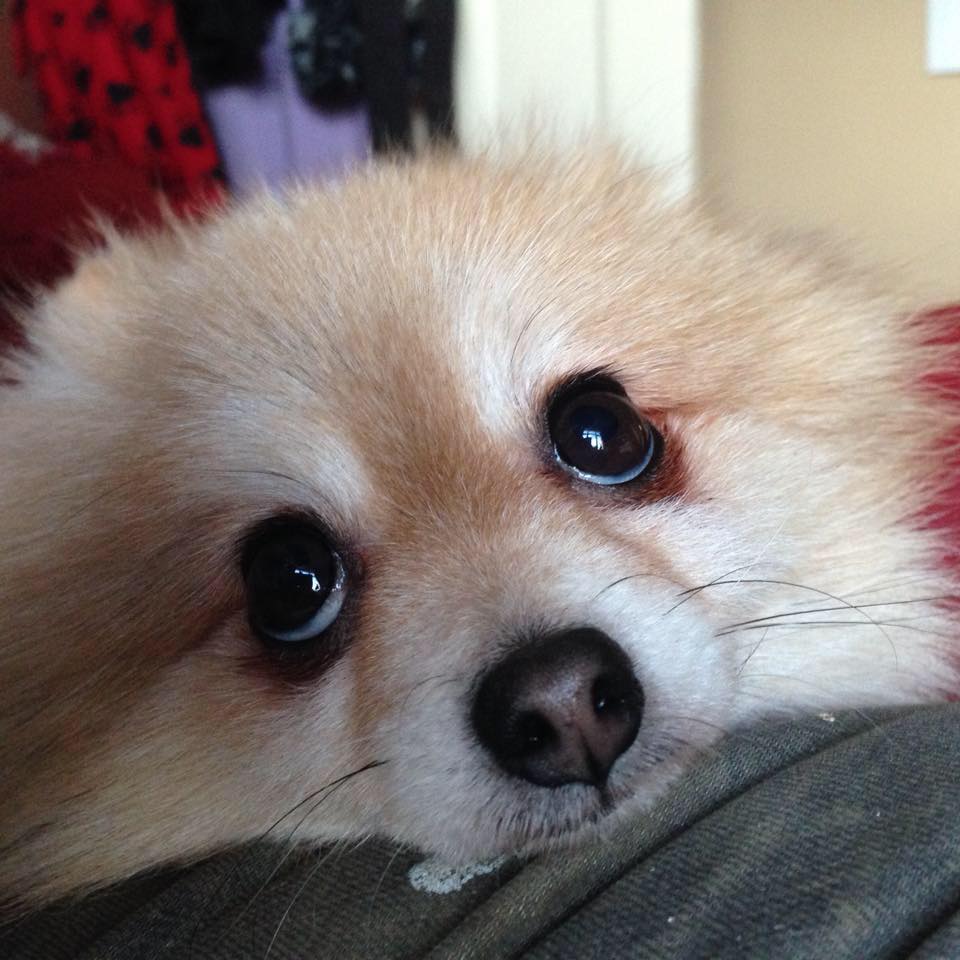Pomeranians are a small breed that originates from Germany and are the smallest member of the Spitz family. Although little, this breed is feisty and demanding they definitely do not see themselves as a breed in the Toy group due to their larger than life personality. So what do you need to know before adding one to your family?
Pomeranians are small
Little in stature, big in heart, an adult Pomeranian will weight between 3-7lbs and grow to 7-12 inches tall, but they haven’t always been so small! Originally bred to pull sledges and as herding dogs, the Pomeranian look has changed a lot over the years and have been bred to be smaller and smaller. This change is size is thought to have been started by Queen Victoria when she came across a tiny Pomeranian and fell in love, hence selectively breeding them to be this small.
Noone has told modern-day Poms that although they used to be big, they are now around the size of a rabbit. The Pomeranian will bark and protect their owner no matter how large the intruder is. They will also run up to dogs many sizes bigger than them to make friends (but more likely to bark at them). They really have no fear!
Although little, Pomeranians are very active dogs who will run and play most the day. They need a decent walk to burn off their energy and for mental stimulation.
Their small size makes them ideal lapdogs and easy to take anywhere. Just remember, being so small they have fragile bones, so teach children to play with them gently and try to discourage them from jumping off from beds or chairs.
Pomeranian’s bark a lot
Pomeranians are excellent guard dogs and will bark to alert you that someone is at the door. They are a good deterrent for unwanted visitors, especially if they cannot be seen as they sound much bigger than they are! They do tend to be wary of strangers and don’t seem to know when to stop barking, so it’s a good idea to teach them a command, like ‘quiet’ to get them to stop. Excessive barking can cause problems with neighbours as their bark is quite loud and repetitive if not properly trained.
As Pomeranians are a loyal breed, they will bark at anything that could be a threat to you to protect you. They can also bark a lot when playing – they definitely enjoy the sound of their own voice!
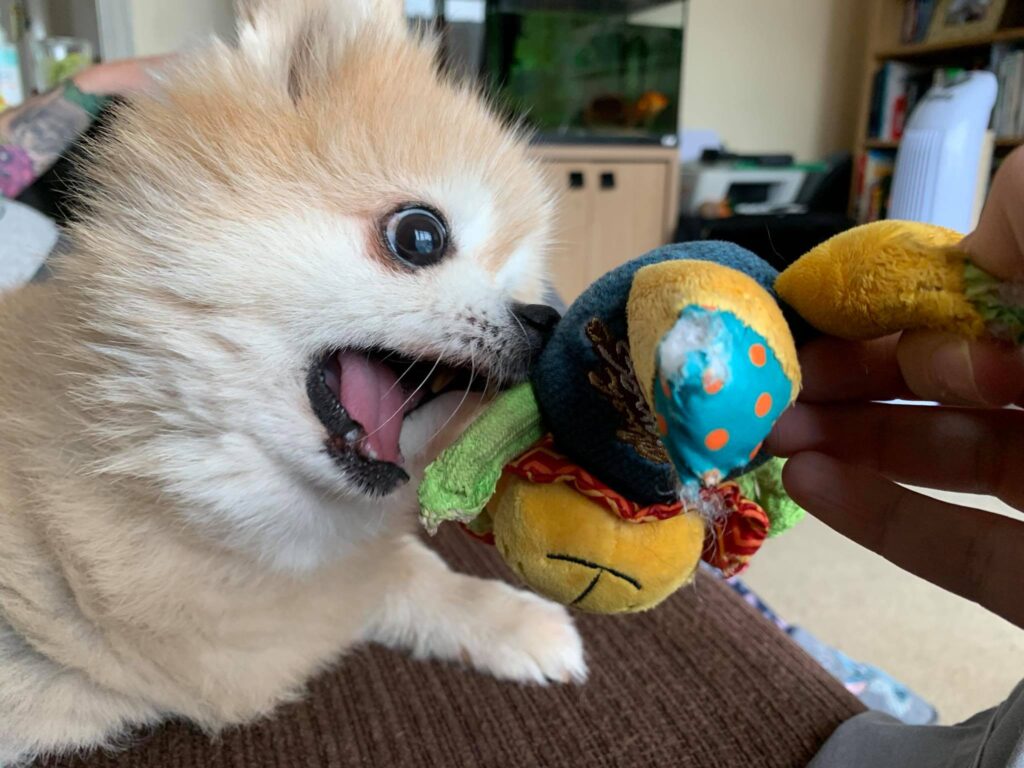
They are prone to heatstroke
Due to their thick coats and short noses, Pomeranians are prone to heatstroke. Because of this, care should be taken in the warm weather and you should only take them out early in the morning or late in the evening when the temperature is cooler. Heatstroke can be deadly. Signs include;
- Panting
- Drooling
- Lethargy
- Red tongue
- Pale gums
- Increased heart rate
- Breathing distress
- Vomiting or diarrhoea (sometimes with blood)
If you suspect your dog is suffering from heatstroke, you must act quickly and contact your vet. See this blog on how to reduce the risk of heat stroke and keep your dog cool. Remember – no dog has died from missing a walk, but walking a dog in the heat could result in them losing their life.
They spin
When Pomeranians are really excited, they spin round in circles with happiness. It’s very cute to watch and they may spin when you get home or whilst you are getting their dinner ready.
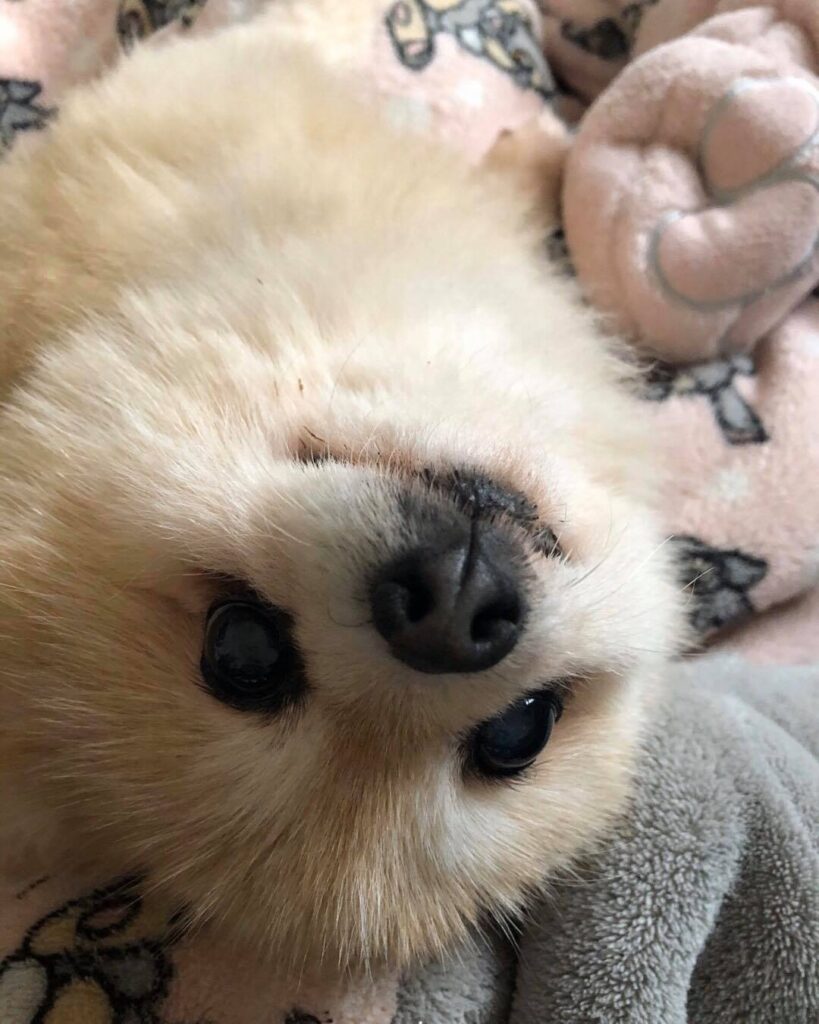
They are prone to luxating patellas
Luxating patella is when the knee cap slips out of place and can be uncomfortable for your dog. This condition is graded from 1 to 5, with one being very mild and 5 being the knee cap is out of place all the time. In mild cases, the knee cap will pop in and out as your dog walks.
Luxating patellas are common in small breeds in general, and they can be genetic. As Pomeranians are small and fragile, you should prevent your Pom from jumping on and off furniture or anywhere high, as this can damage their joints.
If your dog ‘skips’ or is limping, it could be an indication of this so take them to a vet. This condition can be fixed with surgery, but they will need crate rest afterwards for several weeks to allow them time to heal.
They are prone to collapsed tracheas
Collapsed trachea happens when the trachea collapses, making it hard for your dog to breathe. They can be mild, meaning the dog coughs a little or severe where the dog can even pass out. In some cases, surgery can help, but not all dogs are good candidates depending on the location of the collapse (if they are deep within the chest, little can be done) and the health status of the dog.
Symptoms include;
- A honking cough
- Breathlessness/heavy panting after exercise
- Gagging or choking after eating or drinking
A collapsed trachea is a distressing condition for both the dog and owner and if your dog is not able to have surgery, there may be medicine they can have to help, such as bronchiodilators to open the air ways, to cough syrup to soothe the throat.
My own Pomeranian and Chihuahua suffer from this condition and you can read more about it here and here.
They have a long lifespan
Of course, it never feels long enough, but generally, Pomeranians can make it to 12-16 years. By keeping your dog healthy, feeding a good diet and regular vet check-ups, you can hopefully give your dog a long, healthy, happy life.
Their coat needs care
Pomeranians have beautiful long coats that consist of a fluffy undercoat which keeps them warm and top layer and the outer coat is thinner, giving them protection from most weather conditions.
Their coat requires daily brushing to keep them knot-free. The undercoat can become matted, so it’s really important to keep on top of it. There are many different types of brushes;
- Bristle brushes can be used, and there are different bristle options depending on how thick or long the coat is.
- Slicker brushes are used to untangle knots and mats, but care should be taken not to press the brush down too hard as they could hurt your pom.
- Pin brushes are used to brush the undercoat
- A wide-toothed comb is good for cleaning other brushes with, and also to finish off your pom’s coat after brushing.
- Pet angel brushes are excellent to detangle the coat and are very soft.
You can take them to the groomers too for a bath and clip and there are few options for their coat. Some people choose to have a trim to keep the coat neat, but still long. It is a good idea to have a sanitary clip around their bits to keep them clean as poop can get stuck in their fur. Some owners choose to completely shave the coat, giving them a teddy bear look. If you do choose the latter, keep in mind the coat will never grow back the same.
My own Pomeranian is kept short due to his severe collapsed trachea and deformed back legs I find the heavy coat makes him worse. Even though he has a short coat, he still requires daily brushing.
As well as caring for the coat, Pomeranians commonly get tear stains and they are more visible in light coloured dogs. Get your Pom used to having their eyes wiped gently every day with a tear stain remover.
They are very needy
If you want a dog who is happy doing their own thing and being left for long periods, a Pomeranian is not the dog for you. They hate being left alone and are prone to separation anxiety. You will know if your dog has separation anxiety if they bark a lot when left, scratch at the doors or walls, urinate or defecate in the house, pace or become destructive. Even after returning home, your dog could still be suffering from anxiety.
Even if you are home with them, they want to be with you at all times and to sit on your lap. Pomeranians can be taught to spend time on their own and will adjust, but really think about how long and how often you would leave them for. Although they are small and you can potentially take them places with you, if you are leaving them for long periods, they will become very stressed and not fair on the dog.
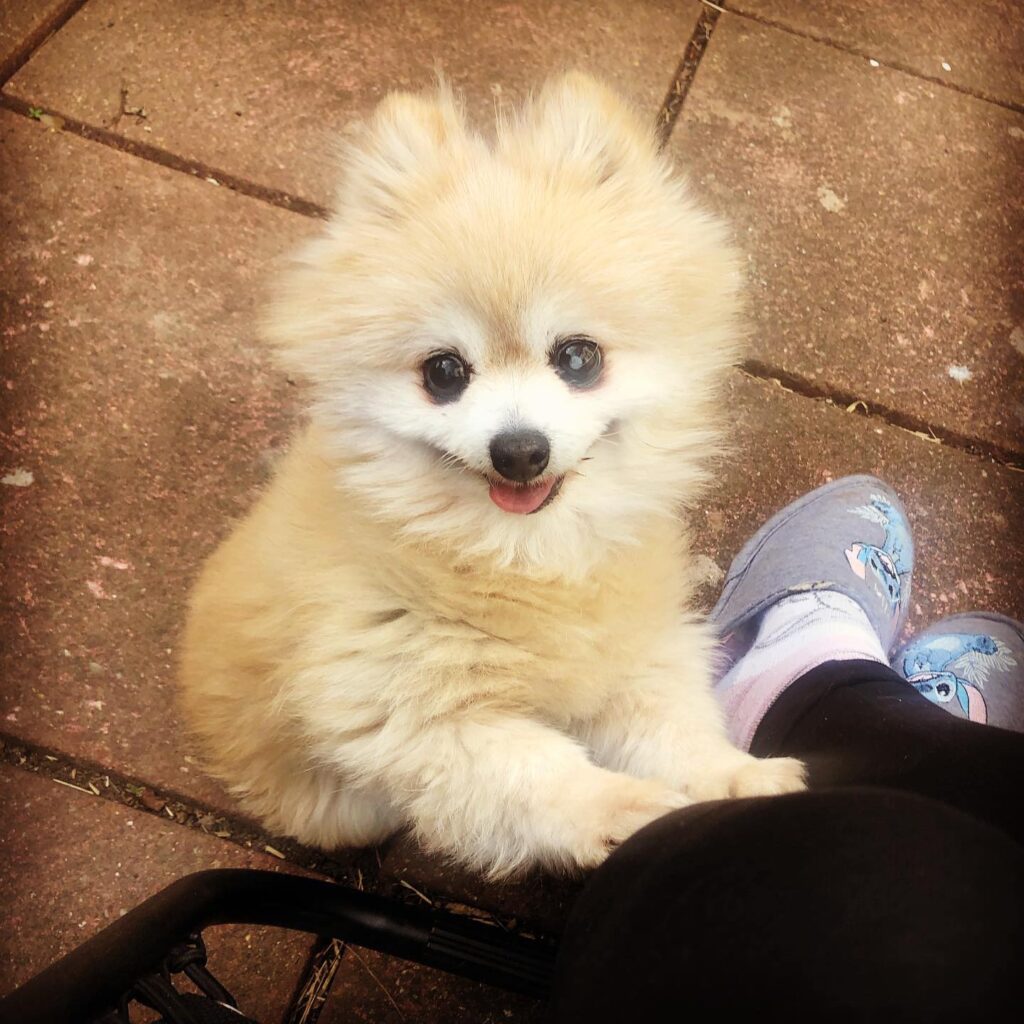
Pomeranians are smart
Pomeranians are intelligent dogs and will pick up cues quite quickly, making them easy to train. You must keep in mind that these little dogs will quickly train you into doing what they want due to their huge eyes and cute faces, however, try not to let them slip into bad habits as this could cause issues in the long run.
They can be harder to house train than other breeds due to only having little bladders, which are even small in puppies! Training takes time and patience and use reward-based training, rather than fear to help you have a good relationship with your dog.
In conclusion, Pomeranians are great dogs for the right people. Make sure you think about vet bills and grooming bills as they can all add up and you will have a friend for life!
What should you keep in your dog’s first aid kit? Click here to find out!

